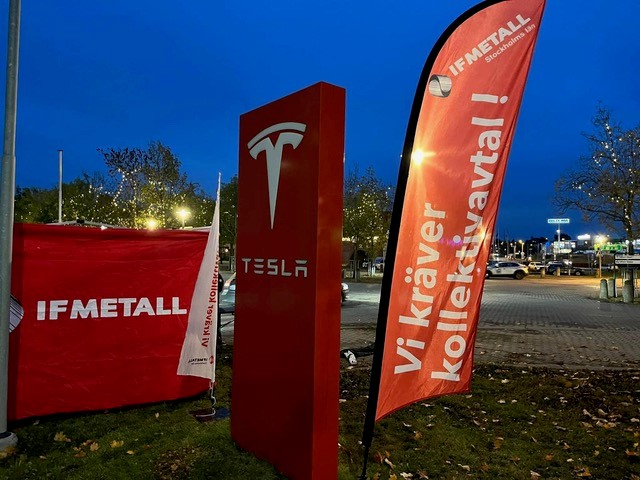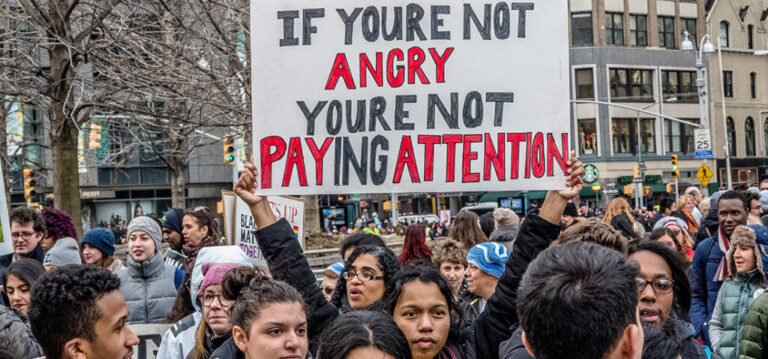
German Bender is a senior research associate at Harvard Law School, an affiliated researcher at the Stockholm School of Economics, and chief analyst at the progressive Swedish think tank Arena
The Swedish strike against Tesla is entering its twelfth week, and none of the parties show any signs of caving. In my previous two updates (on November 1st and 13th), I wrote about the many solidarity strikes called by labor unions supporting IF Metall (the union involved in the primary dispute with Tesla, whose aim is to get a collective bargaining agreement for mechanics in Tesla’s repair shops across the country).
Since then, more unions have joined. At the moment, ten Swedish unions are involved in the conflict, including IF Metall, among them: the electrical workers’ union, which refuses to perform electrical work, such as maintenance or repairs, on Tesla’s charging stations and repair shops; the building maintenance union, which has stopped cleaning Tesla’s shops and offices; the postal workers’ union which blocks deliveries (including license plates for new vehicles) to all Tesla facilities; and the transportation union which has blocked disposal of industrial waste in repair shops and blocked all unloading of Tesla cars delivered to Sweden’s approximately 50 ports, effectively halting Tesla’s car deliveries to Sweden.
This last measure has been mirrored by three unions in Denmark, Norway, and Finland, adding an international dimension to the dispute. The Nordic unions decided to support IF Metall with formal conflict measures after Tesla tried to evade the Swedish dockworkers’ blockade by shipping cars through ports in neighboring countries, and then hauling them to Sweden with trucks.
Tesla has, in turn, responded to the blockade of Nordic ports by shifting to land transport directly from its factory in Germany (Tesla’s only manufacturing plant in Europe, and the second largest outside the US). But this takes longer and is more cumbersome than using large cargo ships.
When postal workers blocked deliveries of license plates for new Tesla vehicles, Elon Musk tweeted: “This is insane”. A few days later, Tesla sued the Swedish government agency in charge of producing license plates and the state-owned company in charge of delivering them. The court has dismissed Tesla’s demands for interim relief and the lawsuits may drag on for months.
In the ongoing cat-and-mouse game that this conflict has turned into, Tesla has found a way to evade the postal blockade. By transferring ownership to Tesla buyers before the license plates have been issued, the new owners can order the new plates to be sent directly to their homes, rather than to Tesla’s offices. This entails a consuming and cumbersome procedure, just as Tesla’s countermeasures to evade the dockworkers’ blockade, but it has allowed the company to continue its operations for the time being.
The second measure targeting Tesla’s car sales is a blockade against a Swedish manufacturing plant operated by a Tesla subsidiary, Hydro Extrusion, which produces a component needed for the production of Tesla’s Model Y in Germany. As a consequence, Hydro Extrusion has said it may have to reduce its workforce with 20 of its over 600 employees, despite the union’s offer to pay the wages of the affected workers until the conflict is settled.
The total number of workers involved in the dispute is unknown, but it may be in the thousands including secondary action (solidarity blockades) in Sweden and abroad. However, far fewer IF Metall members are involved in the primary strike. Tesla claims that only ten percent of the mechanics participate in the strike, but this figure is contested by IF Metall. According to the union, roughly half of the 130 mechanics are union members, and a majority of these are on strike.
Some members have opted not to go on strike, against with the union’s decision. Some of these members have therefore been expelled from IF Metall, a form of sanction specified in the organization’s statute which has never been used before.
Despite the conflict’s expansion, Swedish politicians have largely remained neutral and avoided any intervention. As I have written previously, the prime minister Ulf Kristersson and the employment minister Johan Pehrson have publicly stated that they will not intervene, and that they are confident the parties can resolve the matter among themselves. According to Sweden’s largest newspaper, the Ministry of Employment declined a meeting request by a Tesla lobbyist wishing to “inform” the government about the conflict.
In short, Tesla’s attempt to short-circuit the Swedish labor market model by legal and political means – highly unorthodox measures in Swedish labor relations – have failed.
Appealing to public opinion does not seem to be a viable strategy, either. Popular support for the strike is solid. Two recent polls show that 60-70 percent support the strike, while only 10-20 percent oppose it (the rest are undecided). In the last poll, more than half of the respondents also say that Tesla’s brand has been harmed by the dispute.
Further, corporate pressure from investors is increasing. A group of 16 Nordic institutional investors have written a letter to the Tesla board, urging the company to sign the union agreement. The Danish pension fund PensionDanmark has decided to sell its Tesla holdings, as has the Danish teachers’ pension fund, both citing the dispute as the reason.
Outside the Nordics, the dispute has been widely covered in international media, and boosted the morale of unions in some of Tesla’s key markets. In Germany, IF Metall’s fellow union, IG Metal, has openly expressed its support for the strike. According to IG Metal, union membership in the Tesla factory outside Berlin is growing “faster than expected”. Membership numbers are vital for winning upcoming works council elections at the plant, and to pressure Tesla to bargain with the union or eventually call a strike.
Despite Elon Musk’s hard-nosed anti-union stance, there may be some hope of a pivot in the Swedish dispute, as I recently wrote in an op-ed for The Guardian. At a New York Times forum a few weeks ago, Musk made an interesting statement: “I don’t know, maybe we’ll be unionized. If Tesla gets unionized it will be because we deserve it and we failed in some way.” So, although he is not thrilled about the prospect of unionization, he does not rule it out.
I would argue that part of the reason for his skepticism is that he does not understand what unions to do for workers and for the economy writ large. As I write in The Guardian: “Musk should consider the idiosyncrasies of the Nordic countries with the same interest that he studies car batteries or rocket designs.”
In rankings of the world’s most innovative, competitive and economically free nations, the Nordics consistently come out on top (scoring higher than the US on most measures). This does not come with the cost of labor unrest, especially in Sweden, which is among the labor markets in Europe where conflicts are the rarest. Further, the economic success of Nordic economies and firms does not come with the cost of huge inequality, the region is among the least unequal in the word.
These idiosyncrasies make the Nordic model socially and economically sustainable, and widely supported by both workers and firms. Hopefully, Musk will eventually realize that it makes economic sense to work with the Nordic unions, rather than against them.










Daily News & Commentary
Start your day with our roundup of the latest labor developments. See all
July 11
Regional director orders election without Board quorum; 9th Circuit pauses injunction on Executive Order; Driverless car legislation in Massachusetts
July 10
Wisconsin Supreme Court holds UW Health nurses are not covered by Wisconsin’s Labor Peace Act; a district judge denies the request to stay an injunction pending appeal; the NFLPA appeals an arbitration decision.
July 9
the Supreme Court allows Trump to proceed with mass firings; Secretary of Agriculture suggests Medicaid recipients replace deported migrant farmworkers; DHS ends TPS for Nicaragua and Honduras
July 8
In today’s news and commentary, Apple wins at the Fifth Circuit against the NLRB, Florida enacts a noncompete-friendly law, and complications with the No Tax on Tips in the Big Beautiful Bill. Apple won an appeal overturning a National Labor Relations Board (NLRB) decision that the company violated labor law by coercively questioning an employee […]
July 7
LA economy deals with fallout from ICE raids; a new appeal challenges the NCAA antitrust settlement; and the EPA places dissenting employees on leave.
July 6
Municipal workers in Philadelphia continue to strike; Zohran Mamdani collects union endorsements; UFCW grocery workers in California and Colorado reach tentative agreements.